Students’ and teachers’ views on the goals and purposes of school education
Recieved: 09/27/2018
Accepted: 10/16/2018
Published: 01/30/2019
p.: 109-122
DOI: 10.11621/npj.2018.0410
Keywords: social functions of education; personality models of the school graduate; type of school; teachers; students; persoanl identity
Available online: 30.01.2019
Sobkin, V.S., Rodionova Ksenia E.. Students’ and teachers’ views on the goals and purposes of school education. // National Psychological Journal 2018. 4. p.109-122. doi: 10.11621/npj.2018.0410
Copied to Clipboard
CopyAbstract
Background. Studying students’ and teachers’ views on the goals and purposes of the teaching and upbringing process is important in connection with the modernization of school education. Their attitude to these issues characterizes the social psychological context that determines the role of school in cultural and value-based education of adolescents.
The Objective of the research is to determine the differences between the students’ and teachers’ views on the goals and purposes of school education in relation to the three areas of analysis: between students and teachers, between members of schools types (general education, in-depth study of particular subjects, gymnasium and lyceum), between generations of teachers and students as of 1991 and 2017.
Design. The paper presents the results of survey questionnaire conducted by the Centre for Sociology of Education, IEM RAE, Moscow, Russia, in 2017. The sample included 11 803 students of 7-11 grades and 4 999 school teachers. The data are further compared with the results of the survey 1 conducted in 1991 (sample included 162 students and 681 teachers). Questions concerning goal orientations of school education are considered at two levels: pragmatic ("What should school give to students?") and value-based ("Who should schools prepare their students for?").
Research Results. At the pragmatic level, students attach greater importance to the issues of professional identity, whereas teachers regard the traditional functions of education. At the value-based level for students, the individualistic attitudes are more typical, whereas teachers place a greater value on socially regular patterns. Members of the gymnasia and lyceums more often note the importance of the cultural development as well as communication and interaction between students. Unlike gymnasia and lyceums, general education schools put a greater emphasis on normal behaviour and participation in public life. The admission requirements have increased for socializing functions and training, and also the individualistic attitudes in modern education compared with 1991 have been in the focus of attention. Simultaneously, the importance of creative activity is decreasing and education is aimed at supporting social institution. Factor analysis has revealed three meaningful juxtapositions in relation to which the goals of school education are structured: "norm – self-actualisation", "convention – principle", "romantic approach – pragmatic approach".
Conclusion. This research reveals particular goals and purposes for modern school education in students’ and teachers’ minds that allows them to improve the educational process.
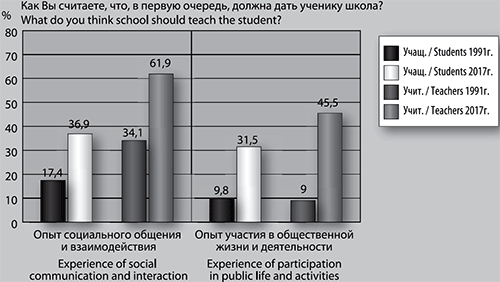
Fig. 1. Students’ and teachers’ views regarding the significance of the tasks of schoolchildren socialization as of 1991 and 2017 surveys (%). Differences are statistically significant at p <.0000
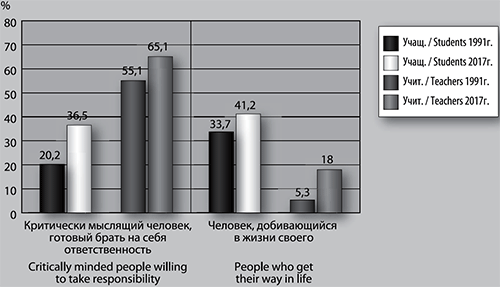
Fig. 2. Change of students’ and teachers’ views of personality role model that are typical of individual behavior as of 1991 and 2017 surveys (%)
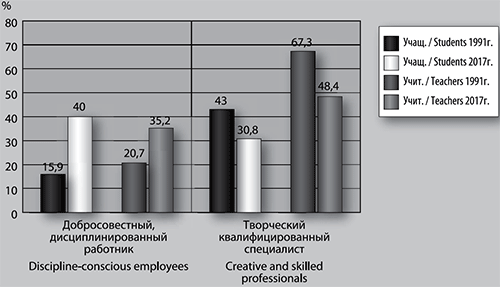
Fig. 3. Students’ and teachers’ attitude to personality models typical of their occupation according to 1991 and 2017surveys (%)
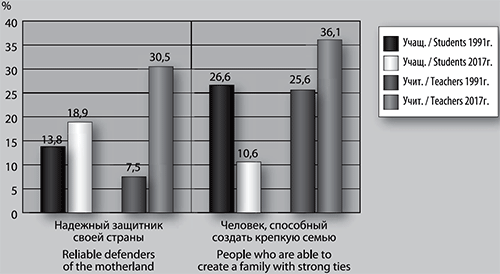
Fig. 4. Change of students’ and teachers’ views of personality role model based on social institutions support as of 1991 and 2017 surveys (%)
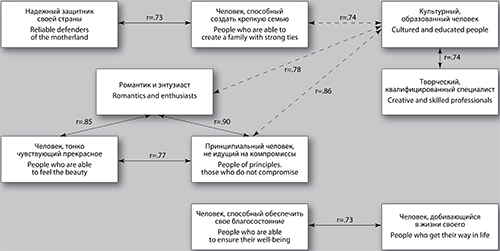
Fig. 5. Correlation relationship between students’ choices of preferable personality role model of the school graduate (co-efficient)
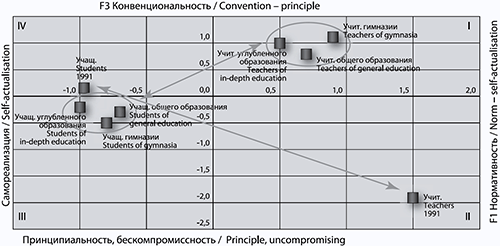
Fig. 6. Valuing different types of schools as of 1991 and 2017 surveys according to F1 (“norm – self-actualisation”) and F3 (“convention – principle”) factors.
Table 1. Students’ and teachers’ views of the tasks of school education (%)
|
What do you think school should teach the student? |
Students N=11 803 |
Teachers N=4 199 |
|
Profound knowledge |
67.0 |
79.8 |
|
Prepare for entering university |
52.2 |
43.6 |
|
Ability to develop students’ abilities |
44.0 |
71.4 |
|
Experience of social communication and interaction |
36.9 |
61.9 |
|
Experience of participation in public life and activities |
31.5 |
45.5 |
|
Sufficient cultural level |
27.1 |
51.0 |
|
Sufficient pre-profile training |
25.0 |
19.5 |
Table 2. Students’ and teachers’ views of the targets of school education (%)
|
What graduates do you think school should prepare? |
Students N=11 803 |
Teachers N=4 199 |
|
Cultured and educated people |
64.7 |
74.0 |
|
People who get their way in life |
41.2 |
18.0 |
|
Discipline-conscious employees |
40.0 |
35.2 |
|
Critically minded people willing to take responsibility |
36.5 |
65.1 |
|
Creative and skilled professionals |
30.8 |
48.4 |
|
People who are able to ensure their well-being |
27.1 |
18.6 |
|
Reliable defenders of the motherland |
18.9 |
30.5 |
|
People who are able to create a family with strong ties |
10.6 |
36.1 |
|
People who are able to feel the beauty |
5.4 |
10.3 |
|
People of principles. those who do not compromise |
4.9 |
3.5 |
|
Romantics and enthusiasts |
4.4 |
4.8 |
Table 3. Students’ and teachers’ views of school graduate’s personality (%)
|
What graduates do you think school should prepare? |
Students 2017 |
Teachers 2017 |
||||
|
General Education N=8385 |
In-Depth Learning N=852 |
Gymnasium N=1113 |
General Education N=3442 |
In-Depth Learning N=234 |
Gymnasium N=283 |
|
|
Reliable defenders of the motherland |
19.6 |
16.9 |
13.9 |
31.2 |
21.8 |
27.2 |
|
Discipline-conscious employees |
41.3 |
36.2 |
36.9 |
36.1 |
31.2 |
28.3 |
|
Critically minded people willing to take responsibility |
36.2 |
35.4 |
38.8 |
63.8 |
70.9 |
74.9 |
|
Cultured and educated people |
65.0 |
63.7 |
65.4 |
73.3 |
78.2 |
82.3 |
|
Creative and skilled professionals |
30.1 |
32.4 |
34.4 |
48.3 |
53.8 |
45.9 |
References:
Biesta, G. (2015). What is education for? On good education, teacher judgement, and educational professionalism. European Journal of Education, 50(1), 75–87. doi: 10.1111/ejed.12109
Cranston, N., Kimber, M., & Mulford, B., et.al. (2010). Politics and school education in Australia: a case of shifting purposes. Journal of Educational Administration, 48(2), 182–195. doi: 10.1108/09578231011027842
Davydov V.V. (1979). Persons need to “stand out”. [S chego nachinaetsya lichnost’], 109–140.
Davydov V.V. (1996). Theory of developmental learning. Moscow, INTOR.
Durkheim E. (1996). Sociology of Education, Moscow, INTOR.
Ginzburg, M.R. (1994). Psychological content of personal self-determination. [Voprosy psykhologii], 3, 43–52.
Kadir, A., & Akshir, M. (2017). What Teacher Knowledge Matters in Effectively Developing Critical Thinkers in the 21st Century Curriculum? Thinking Skills and Creativity, 23, 79–90. doi: 10.1016/j.tsc.2016.10.011
Kaplan, A., & Hanoch, F. (2012). Identity formation in educational settings: A critical focus for education in the 21st century. Contemporary Educational Psychology, 37(3), 171–175. doi: 10.1016/j.cedpsych.2012.01.005
Kennedy, A. (2014). What do professional learning policies say about purposes of teacher education? Asia-Pacific Journal of Teacher Education, 43(3), 183–194. doi: 10.1080/1359866x.2014.940279
Kon I.S. (2007). Psychology high school student. Moscow, Prosveshchenie.
Konshina T.M., Pryazhnikov N.S., & Sadovnikova T.Yu. (2018). Personal professional perspective of modern Russian elder adolescents: value-semantic aspect. [Vestnik Moskovskogo universiteta], Series 14. Psychology, 3, 37–59.
Lipnicka, M. (2008). Goals of Children’s education in Nursery schools in the Past and at Present. New Educational Review, 15(2), 152–166.
Marcia, J.E. (1980). Identity in adolescence. Handbook of adolescent psychology. N.Y.: John Wiley.
Ojo, O.A., & Adu, E.O. (2017). Transformation of teaching quality in secondary school education: Teachers’ conception. Perspectives in Education, 35(2), 60–72. doi: 10.18820/2519593X/pie.v35i2.5
Popkewitz, T.S. (1991). A political sociology of educational reform: Power/knowledge in teaching, teacher education, and research. Teachers College Press.
Reimers, F. (2006). Citizenship, Identity And Education: Examining The Public Purposes Of Schools In An Age Of Globalization. Prospects, 36(3), 275–294. doi: 10.1007/s11125-006-0009-0
Schafft, K. A., & Biddle, C. (2013). Place and Purpose in Public Education: School District Mission Statements and Educational (Dis) Embeddedness. American Journal of Education, 120(1), 55–76. doi:10.1086/673173
Sobkin, V.S., & Pisarskii, P.S. (1996). A Sociocultural Analysis of the Educational Situation in the Megalopolis. Part 1. Sociocultural Orientations: Life Values, Attitudes, and Motives. Russian Education and Society, 38 (5), 1–91. doi: 10.2753/RES1060-939338056
Sobkin, V.S., & Pisarskii, P.S. (1996) A Sociocultural Analysis of the Educational Situation in the Megalopolis. Part 1. Sociocultural Orientations: Life Values, Attitudes, and Motives. Russian Education and Society, 38 (6), 1–96. doi: 10.2753/RES1060-939338063
Sobkin, V.S., & Pisarskii, P.S. (1996) A Sociocultural Analysis of the Educational Situation in the Megalopolis. Part II Attitudes Toward Education: Its Current State, Success, and Goal Orientations [Continued]. Russian Education and Society, 38(7), 5–47. doi: 10.2753/RES1060-939338075
Sobkin V.S. (ed.) (2003). Tolerance in the adolescent subculture. Works on the sociology of education. Vol. VIII. Issue XIII. Moscow, TSSO RAO, 391.
Sobkin V.S. (2006). Vasily Vasilyevich Davydov: continuation of one conversation. [Sotsiologiya obrazovaniya: besedy, tekhnologii, metody], 9-23.
Sobkin V.S. et al. (1988). School – 1988. Problems. Contradictions. Perspectives. Moscow, VNIK «Skhola».
Sobkin V.S. (1997). A senior in the world of politics: an empirical study. Moscow, TSSO RAO.
Sobkin V.S. et al. (2005). Adolescent: norms, risks, deviations. Works on the sociology of education. Vol. X. Iss. XVII. Moscow, TSSO RAO, 359.
Sobkin V.S., & Adamchuk D.V. (2016). Modern teacher: life and career choice. Moscow, FGBNU IUO RAO.
Sobkin V.S., & Pisarsky P.S. (1994). Life values and attitudes towards education: cross-cultural analysis, Moscow-Amsterdam (based on sociological survey of teachers, students and their parents). Moscow: Tsentr Sotsiologicheskogo Obrzovaniya RAO.
Sobkin V.S., & Pisarsky P.S. (1992). Socio-cultural analysis of the educational situation in the megapolis – Moscow, Ministerstvo Obrazovaniya RF.
Thornberg, R., & Ebru, O. (2016) Moral and citizenship educational goals in values education: A cross-cultural study of Swedish and Turkish student teachers’ preferences. Teaching and Teacher Education, 55, 110–121. doi: 10.1016/j.tate.2016.01.002
Tirri, K. (2011) Holistic school pedagogy and values: Finnish teachers’ and students’ perspectives. International Journal of Educational Research, 50(3), 159–165. 10.1016/j.ijer.2011.07.010
Tirri, K., Moran, S., & Mariano, M.J. (2016) Education for purposeful teaching around the world. Journal of Education for Teaching, 42(5), 526–531. doi: 10.1080/02607476.2016.1226551
Tolstykh N. N., & Prigozhan A.M. (2016). Psychology of adolescence. Moscow, Yurayt.Sobkin, V.S., Rodionova Ksenia E.. Students’ and teachers’ views on the goals and purposes of school education. // National Psychological Journal 2018. 4. p.109-122. doi: 10.11621/npj.2018.0410
Copied to Clipboard
Copy

